

7 Essential Facts About Emotional Support Animal Arkansas
by Lena Park
Last updated: July 24, 2025
Verified and Approved by:
Angela Morris,
MSW, LCSW
Fact Checked

Overview
This article delves into the vital aspects of emotional support animals (ESAs) in Arkansas, shedding light on their legal protections and the compassionate process to obtain ESA letters. For many individuals grappling with mental health challenges, the presence of an ESA can be a source of comfort and stability. It’s important to recognize the emotional struggles that come with these challenges, and how ESAs can provide the support needed to navigate them.
Under laws such as the Fair Housing Act, individuals can secure housing and travel with their ESAs, offering a sense of relief and companionship. Services like Wellness Wag streamline the process of obtaining necessary documentation, ensuring that those in need can receive timely support. This efficient process is designed to alleviate the stress of acquiring ESA letters, allowing individuals to focus on their mental well-being.
Having an ESA can significantly enhance one’s quality of life, providing not just companionship, but also emotional support during difficult times. The journey to securing an ESA letter may seem daunting, but it is a step towards nurturing mental health and finding peace. Remember, you are not alone in this journey, and there are compassionate solutions available to help you along the way.
Introduction
Navigating the complexities of emotional support animals in Arkansas can feel overwhelming for those seeking comfort and companionship during difficult times. Many individuals face emotional challenges that can be isolating, leaving them longing for connection and support. This article explores essential facts about emotional support animals, emphasizing the legal protections, eligibility criteria, and the compassionate process for obtaining ESA letters.
As awareness of mental health issues grows, a pressing question emerges: how can individuals effectively advocate for their rights and ensure they receive the support they truly need? Understanding these dynamics is vital for anyone considering the profound benefits of having an emotional support animal by their side. The journey toward healing and companionship is available, and with the right information and support, individuals can find the solace they seek.
Wellness Wag: Streamlined Process for Obtaining ESA Letters in Arkansas
Navigating the complexities of mental health can be incredibly challenging, and many individuals find themselves in need of support. Wellness Wag understands these struggles and offers a user-friendly platform for obtaining emotional support animal Arkansas documents. The journey begins with a brief online assessment to determine eligibility, followed by a personalized consultation with licensed medical professionals who genuinely care about your well-being.
Once approved, you can expect to receive your official ESA letter within just 24 hours. This rapid turnaround ensures that you have the necessary documentation for housing or travel, offering peace of mind during difficult times. It is especially beneficial for those facing urgent restrictions due to their mental health conditions, allowing you to focus on what truly matters—your emotional well-being.
With over 50,000 patients assisted, Wellness Wag has positioned itself as a reliable resource, merging accessibility with a compassionate approach to mental health care. Imagine the comfort of having an emotional support animal Arkansas by your side, providing companionship and understanding in your journey towards healing.
To take the first step towards prompt emotional assistance, we invite you to complete the online evaluation on the Wellness Wag website today. Remember, you are not alone in this journey; support is available, and Wellness Wag is here to help you every step of the way.
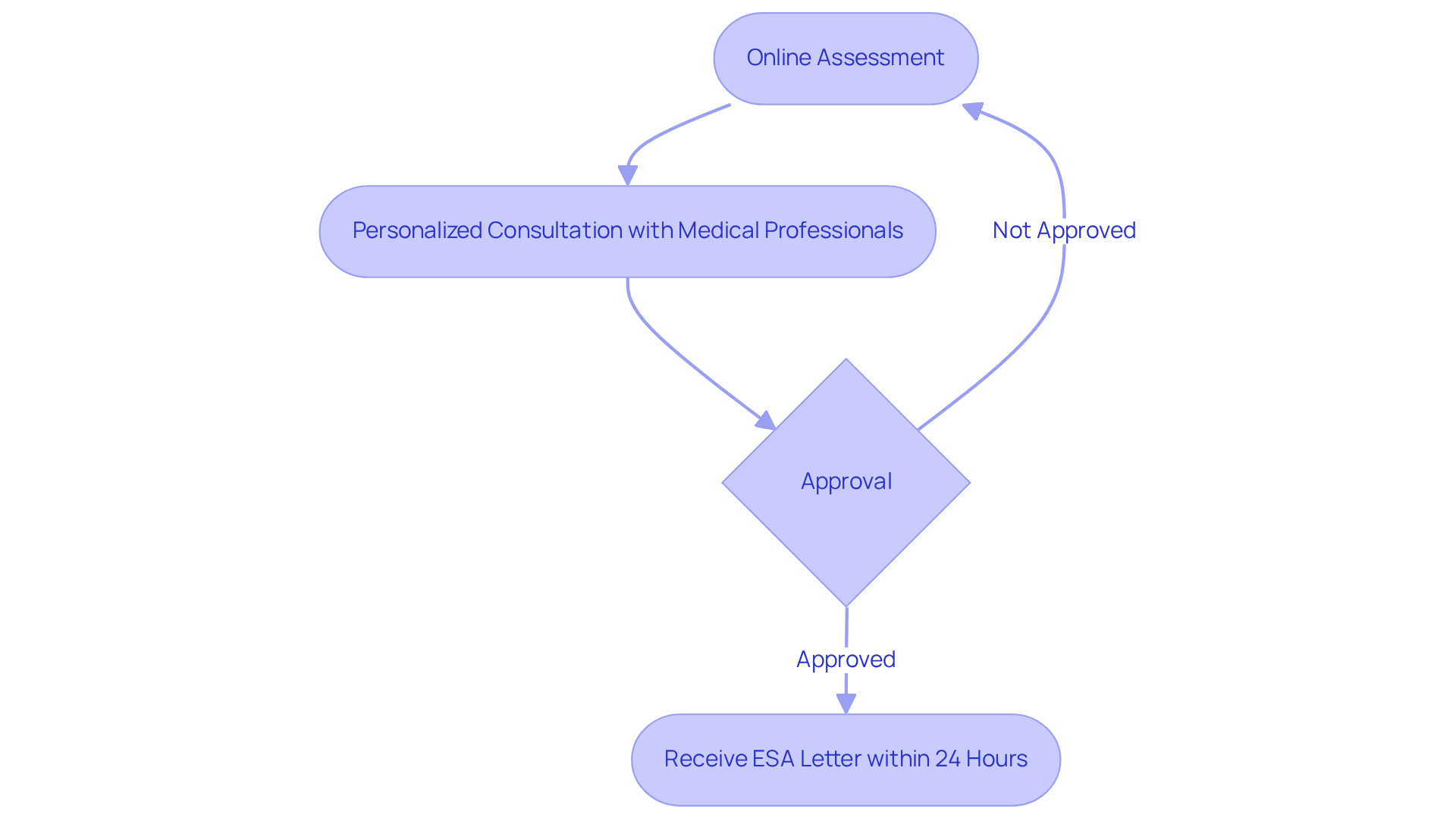
Arkansas ESA Laws: Key Regulations and Rights for Animal Owners
In Arkansas, individuals facing emotional challenges can find solace in emotional support animals Arkansas, which are protected under the Fair Housing Act (FHA) and the Air Carrier Access Act (ACAA). These important laws empower those with mental health conditions to live alongside their ESAs in housing that typically restricts pets and to travel with them on airlines. Under the FHA, landlords are required to provide reasonable accommodations for ESAs, meaning they cannot impose additional fees or deposits for these beloved companions. Moreover, landlords must respond to ESA requests within 10 days, ensuring that individuals receive timely access to the support they need.
It’s essential to recognize that ESAs differ from service dogs, which are specially trained to perform tasks for individuals with disabilities and enjoy broader legal rights under the ADA. While ESAs offer emotional comfort and support, they do not have the same access rights in public spaces, such as restaurants or stores. Legal experts emphasize that owners of an emotional support animal in Arkansas have the right to live peacefully with their pets, free from discrimination, highlighting the importance of understanding these regulations. Approximately 18% of pet owners in the U.S. currently have ESAs, and this number continues to rise as awareness of their mental health benefits grows. Real-world examples underscore the effectiveness of these laws; for instance, in 2020, the U.S. Department of Housing charged a landlord in St. Paul for discriminating against an individual with an ESA, showcasing the legal recourse available to those facing similar challenges.
Arkansas law HB1420 further strengthens these protections by requiring licensed mental health professionals to establish a 30-day relationship with clients before issuing documentation for an emotional support animal Arkansas, ensuring the legitimacy of the process. This law also mandates annual reevaluations to prevent fraud, thereby preserving the integrity of ESA ownership. To effectively advocate for their rights, ESA owners should communicate openly with landlords and airlines about their legal protections, ensuring their emotional support animals are recognized and accommodated. By understanding these rights and actively seeking support, individuals can foster a nurturing environment for both themselves and their ESAs.
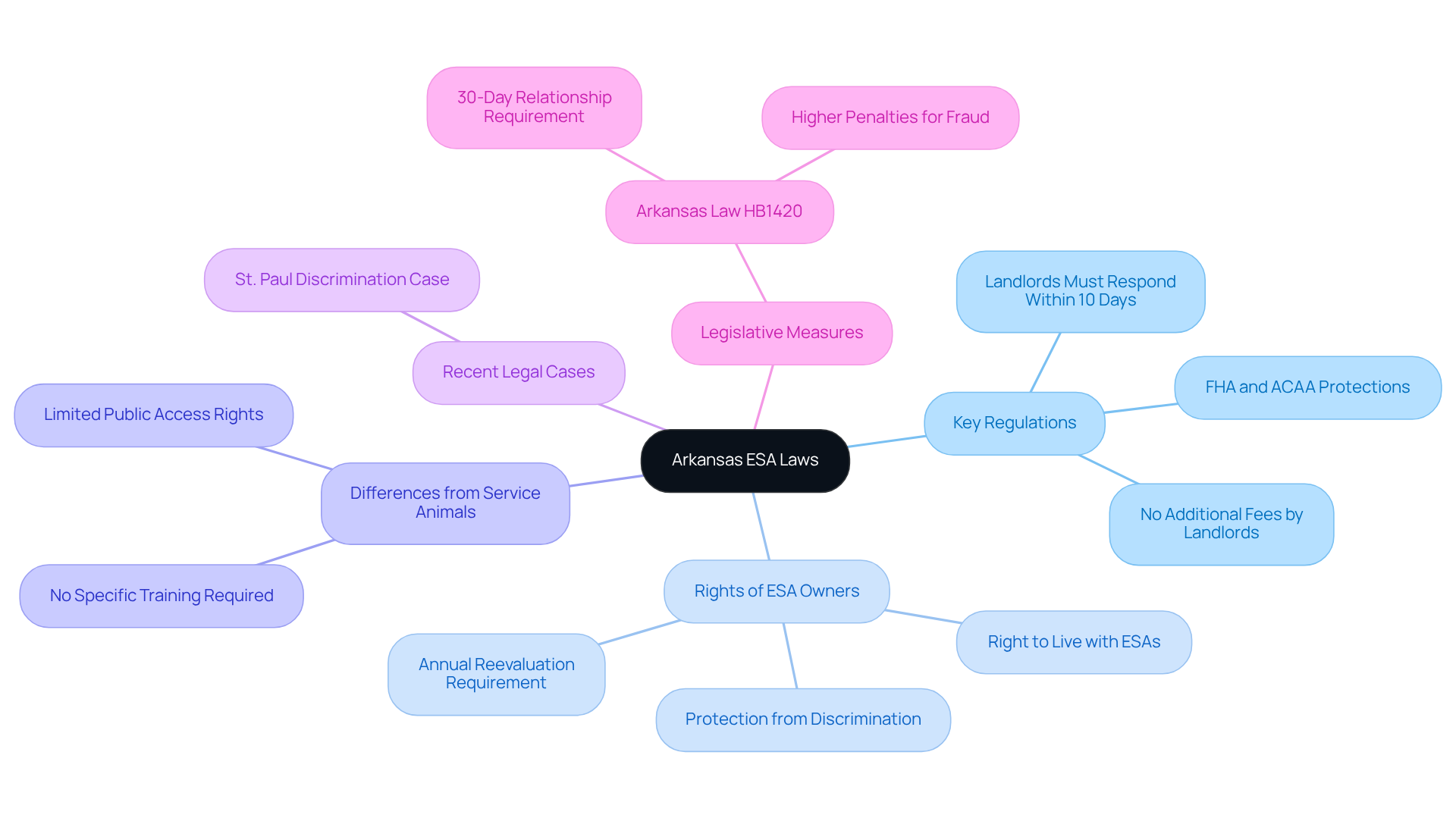
Eligibility Criteria: How to Qualify for an ESA Letter in Arkansas
Navigating mental health challenges can be incredibly difficult. In Arkansas, individuals struggling with conditions like anxiety, depression, or PTSD may find solace in an emotional support animal Arkansas. It’s important to recognize that approximately 19% of adults in Arkansas face mental health issues, with anxiety and depression being particularly common. The journey to obtaining an ESA letter often begins with a compassionate consultation with a licensed mental health professional. This dedicated expert will assess your unique needs and determine how an ESA could support your emotional well-being.
In Arkansas, the law stipulates that you must have a minimum 30-day relationship with a licensed mental health professional before an emotional support animal Arkansas letter can be issued. This requirement ensures that the professional can truly understand your situation and provide the best possible support. As Vanessa, a licensed clinical social worker with over 20 years of experience, insightfully states, ‘A licensed mental health professional can evaluate your current mental and emotional health and assess how an ESA might fit into your treatment plan.’
Wellness Wag is here to help streamline this process, connecting clients with qualified professionals who can provide the necessary documentation efficiently. This thoughtful approach not only facilitates access to emotional support animal Arkansas but also ensures compliance with the legal standards established by Arkansas law. Remember, you are not alone on this journey; there is support available to help you thrive.
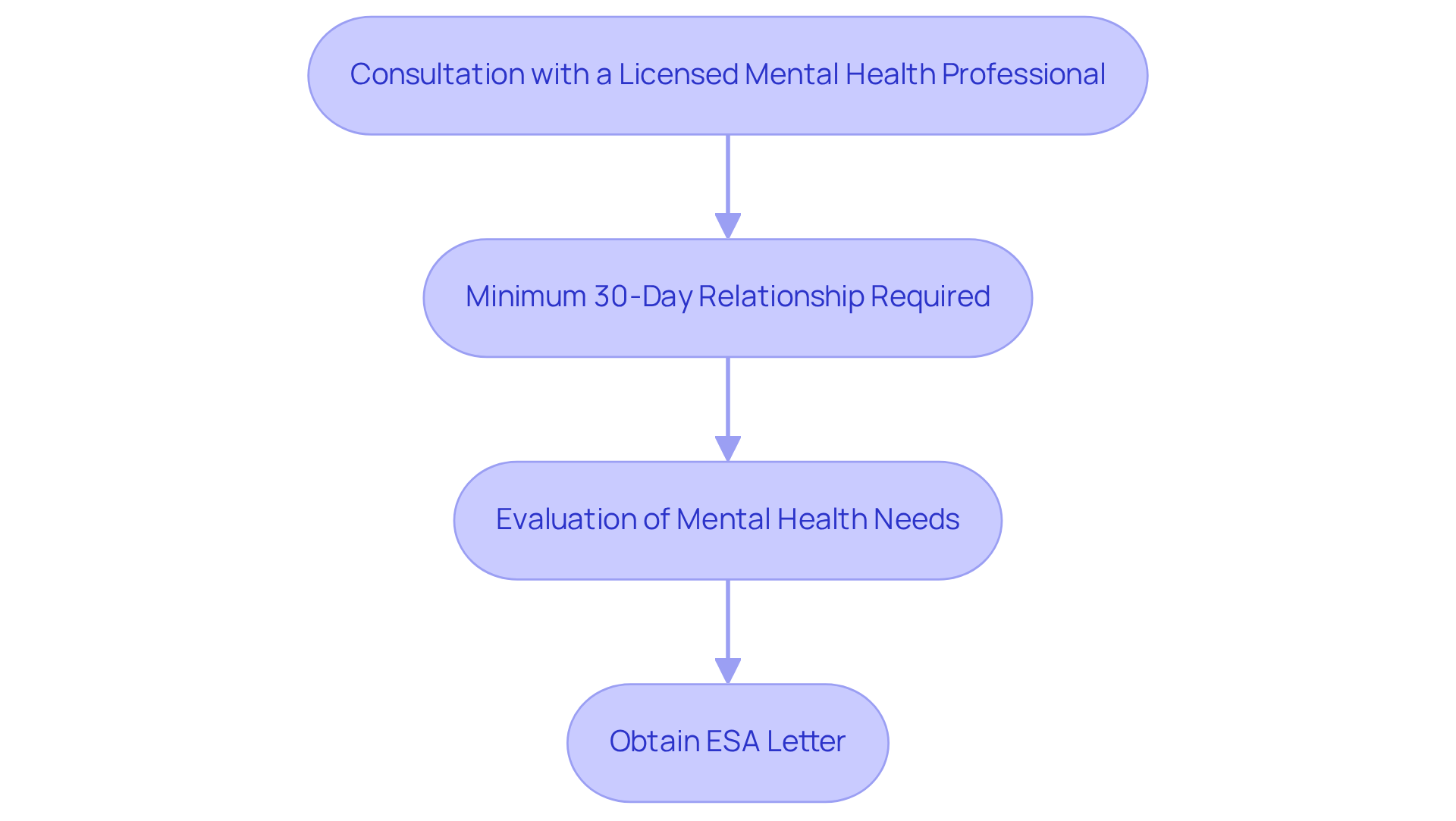
Service Animals vs. Emotional Support Animals: Understanding the Differences
Assistance creatures play a vital role in supporting individuals with disabilities by performing essential tasks, such as guiding the visually impaired or alerting those with hearing impairments. In contrast, emotional support creatures (ESAs) offer comfort and companionship, yet they do not possess the specialized training required for specific tasks. Under the Americans with Disabilities Act (ADA), service creatures enjoy broader access rights, allowing them to accompany their handlers in various public spaces, including restaurants and stores. Conversely, ESAs are primarily protected under housing and airline regulations, which means their access rights are more limited and often contingent upon specific documentation, such as a valid ESA letter.
It’s crucial to respect the working status of service dogs and avoid distracting or petting them without permission from their handlers. Interacting with a service dog without permission can interfere with their tasks and compromise the safety and well-being of the handler. Observing proper etiquette ensures their uninterrupted focus, which is essential for their effectiveness.
Many individuals may not fully understand these differences; studies indicate that around 60% of people do not completely grasp the distinctions between assistance creatures and ESAs. This lack of awareness can lead to confusion and misinterpretation of rights, particularly in public settings. Disability rights advocates emphasize the importance of educating the public about emotional support animal Arkansas access rights, believing that a better understanding can foster a more inclusive atmosphere for those who rely on these animals for emotional support.
Real-world examples illustrate the challenges faced by ESA owners. For instance, while a service creature may accompany its handler into a restaurant, an ESA may be denied entry unless the establishment has specific policies accommodating emotional support companions. This discrepancy underscores the necessity for ESA owners to be well-informed about their rights and the legal protections available to them, especially regarding emotional support animal Arkansas, where regulations may differ.
In summary, understanding the distinctions between service creatures and ESAs is essential for both owners and the public. By educating ourselves and others, we can create a more supportive environment for those who depend on these creatures. It is important for ESA owners to always carry their valid ESA letters and familiarize themselves with local laws to ensure they can effectively navigate access challenges.
![]()
Types of Animals Recognized as Emotional Support Animals in Arkansas
In Arkansas, a diverse range of creatures can qualify as Emotional Support Animals (ESAs), including dogs, cats, rabbits, and even birds. While dogs and cats remain the most favored options, the essential requirement is that the creature provides comfort as an emotional support animal in Arkansas, helping to ease symptoms associated with disabilities. Many individuals face emotional challenges that can feel overwhelming at times. Research indicates that approximately 18% of pet owners in the U.S. have ESAs, reflecting a growing recognition of their mental health benefits. This growing acceptance highlights the importance of having a supportive companion during difficult times.
Authorized experts play a vital role in assessing the appropriateness of a creature for emotional assistance, ensuring that each ESA meets the specific needs of its owner. This is particularly crucial in university housing, where ESAs are permitted to promote equal opportunities for students with disabilities, allowing them to fully enjoy residential life. Imagine the comfort of having a furry or feathered friend by your side, helping you navigate daily challenges. Veterinarians emphasize that various species, including rabbits and birds, can effectively serve as ESAs, provided they foster a supportive bond with their owners. As one veterinarian remarked, “Various creatures can offer distinct emotional support, and it’s crucial to select one that fits with your lifestyle and emotional requirements.” This flexibility empowers individuals to choose the creature that best matches their lifestyle and emotional needs, creating a nurturing environment for healing and growth.
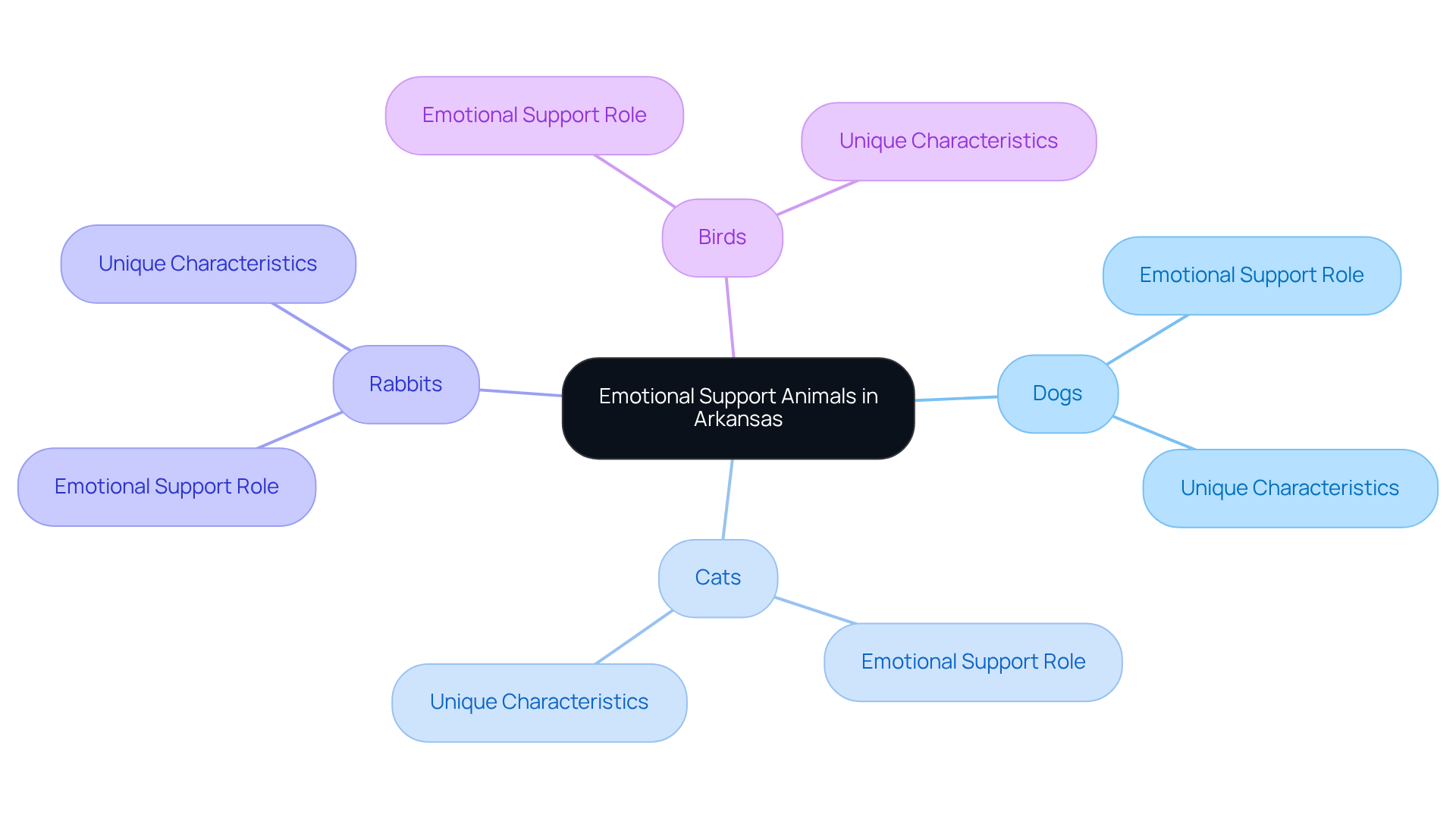
Requesting Reasonable Accommodations: Steps for ESA Owners in Housing
For owners of an emotional support animal in Arkansas, navigating the housing landscape can be daunting, especially when it comes to securing reasonable accommodations. It’s important to start this journey by presenting your landlord with a copy of your ESA letter. This letter is not just a formality; it is your official documentation that highlights your need for the animal’s companionship. Remember, you have rights under the Fair Housing Act, which ensures that landlords must allow ESAs in rental properties without imposing any additional fees or deposits.
If you encounter resistance from your landlord, it’s completely understandable to feel overwhelmed. Seeking legal advice or assistance from organizations that specialize in housing rights for individuals with disabilities can provide the support you need. Research shows that around 70% of landlords comply with ESA accommodation requests when provided with valid documentation. This statistic can be reassuring, reminding you that you are not alone in this process.
Maintaining open communication with your landlord is key. Being ready to discuss the benefits of having an ESA can further strengthen your case. It’s essential to understand your rights and take proactive steps to address any potential discrimination. Advocates emphasize the importance of this knowledge, as it empowers owners of emotional support animal Arkansas to secure the assistance they need for their mental health. Remember, you deserve to feel supported and understood in your journey toward well-being.
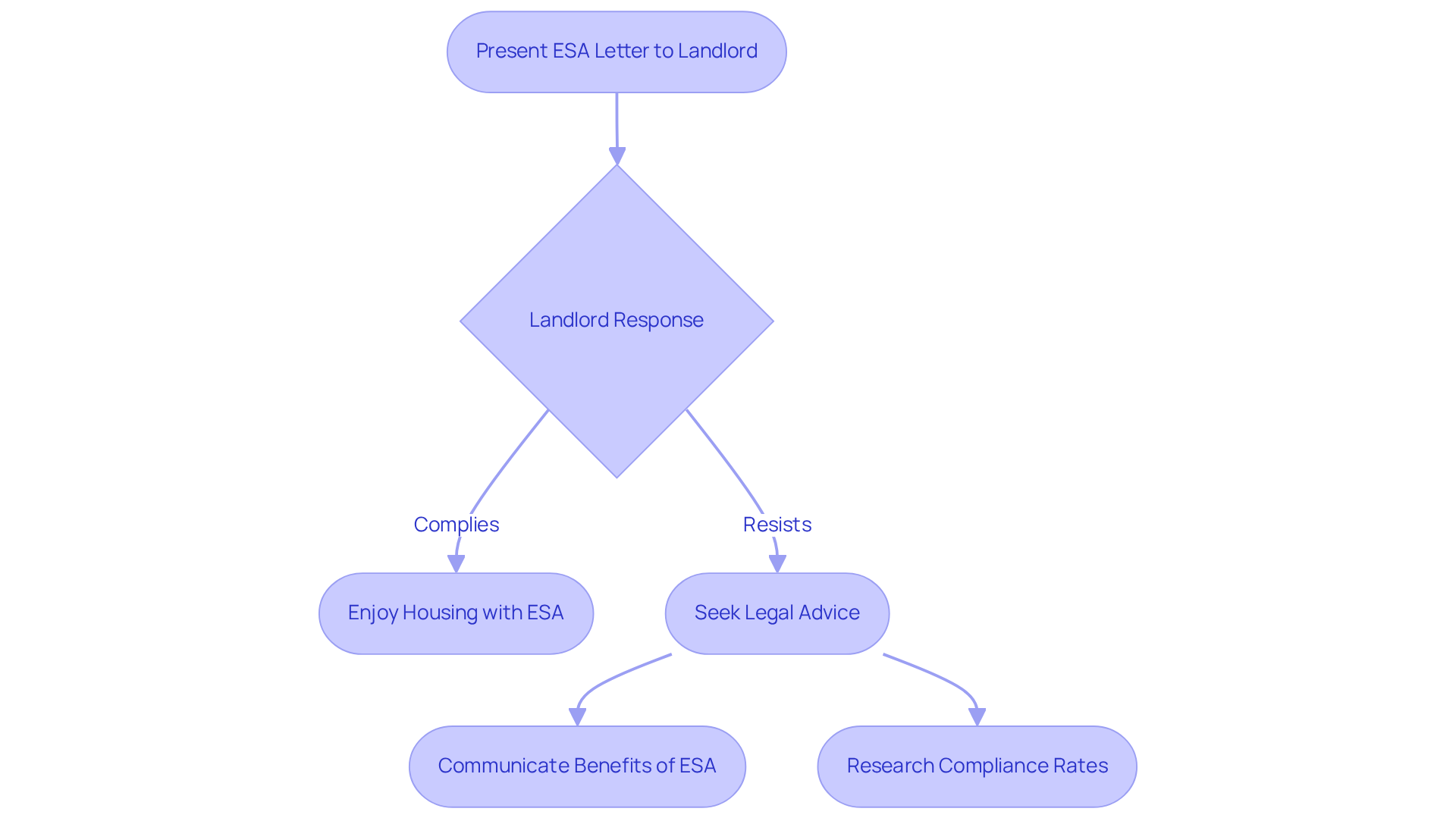
Landlord Inquiries: What Housing Providers Can and Cannot Ask About ESAs
Navigating the complexities of housing can be particularly challenging for those with mental health issues. Landlords are permitted to request paperwork confirming the need for an emotional support animal in Arkansas, typically in the form of an ESA document from a licensed mental health expert. This letter, which must be written on official letterhead and include the provider’s license number, serves to validate the individual’s qualifying disability and the recommendation for an ESA as part of their care plan. However, it’s important to remember that landlords cannot delve into the specifics of an individual’s mental health condition or impose additional fees for the ESA. Understanding these legal boundaries is essential for ESA owners, as it helps protect their rights and prevents potential discrimination.
Emotional assistance animals play a vital role in providing comfort and support to individuals grappling with psychological or emotional disorders. Unlike service dogs, ESAs are not trained to perform specific tasks and do not enjoy the same legal rights and access to public spaces as service dogs under the ADA. In Arkansas, owners of emotional support animals face an ongoing obligation: they must be reassessed and provided with a new emotional support animal Arkansas document each year. This requirement underscores the importance of staying informed and proactive.
Statistics reveal a concerning rise in discrimination cases related to ESA inquiries by landlords, emphasizing the need for clear communication and adherence to regulations. Under the Fair Housing Act, for instance, landlords are required to accommodate tenants with valid ESA letters, which means they must allow an emotional support animal in Arkansas, even in the presence of a ‘no pets’ policy. This legal framework empowers ESA owners to advocate for their rights effectively, especially in pet-restricted housing situations.
By understanding what landlords can and cannot ask, ESA owners can approach housing challenges with greater confidence. It is advisable for ESA owners to keep their documentation current and fully grasp their rights under the Fair Housing Act. Remember, you are not alone in this journey; support is available, and being informed is a crucial step toward ensuring your emotional well-being and housing stability.
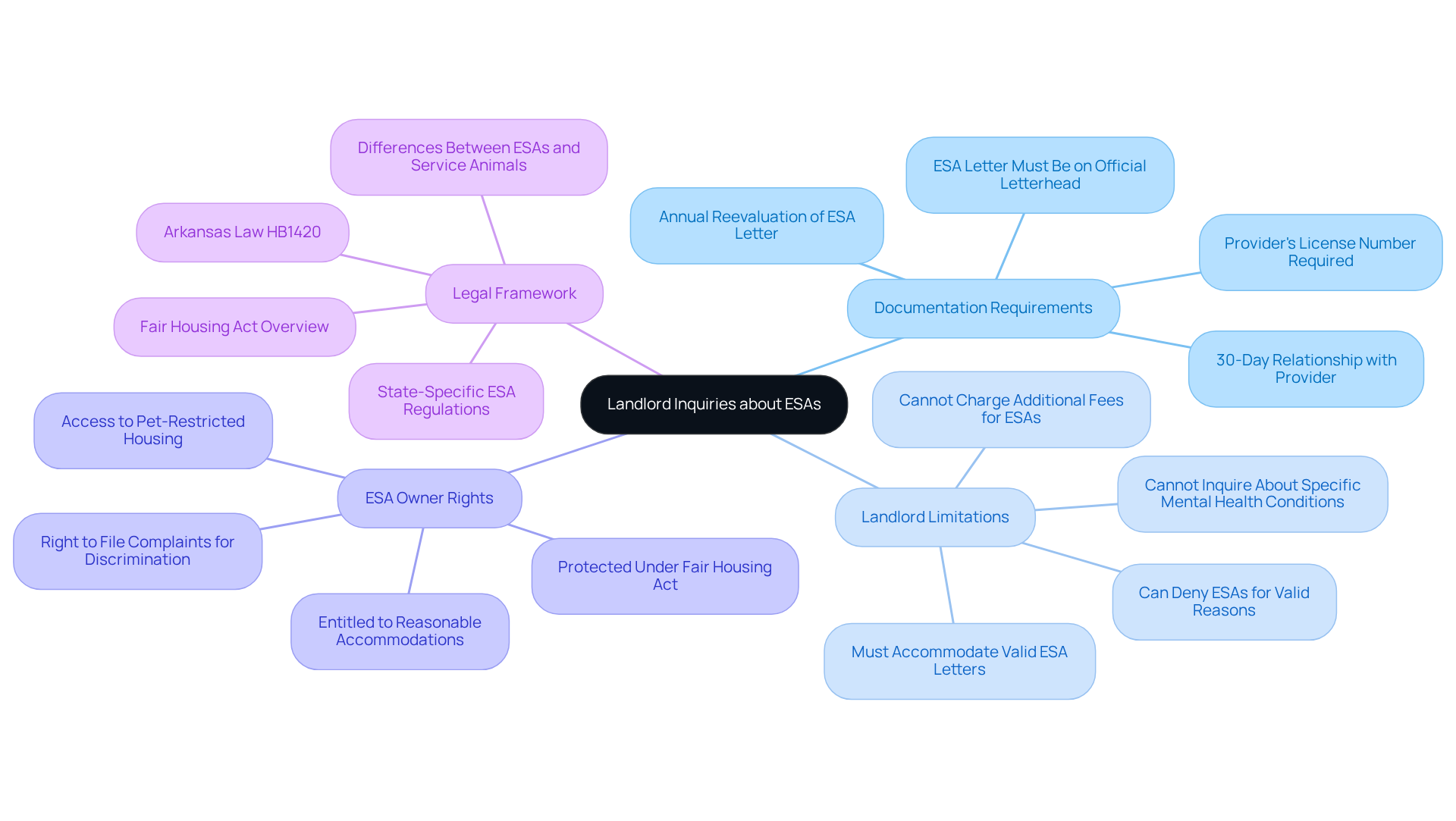
Can Landlords Deny ESA Requests? Understanding Your Rights in Arkansas
In Arkansas, many individuals face the emotional challenge of securing an emotional support animal Arkansas to help them through tough times. It’s important to know that landlords cannot deny ESA requests solely based on the breed, size, or weight of the pet. However, they do have the right to decline requests if the animal poses a direct threat to health or safety, or if the property cannot accommodate the creature. Understanding these conditions is crucial for ESA owners, as it empowers them to advocate for their rights when faced with unjust denials. Legal professionals emphasize that landlords must provide valid reasons supported by legal grounds when rejecting an ESA request.
Have you ever felt the weight of uncertainty when seeking support? Documenting all communications with landlords regarding ESA requests can be vital in resolving disputes and ensuring your voice is heard. Awareness of your rights and responsibilities can truly empower you to navigate potential challenges effectively. Furthermore, according to Arkansas state law (HB1420), it’s necessary to establish a 30-day relationship with a licensed mental health professional before obtaining an emotional support animal Arkansas document.
Emotional support animals (ESAs) differ from service dogs; they offer emotional comfort and support but are not trained to perform specific tasks. Unlike service dogs, ESAs do not share the same legal rights and access to public spaces under the ADA. It’s heartening to know that Wellness Wag has effectively assisted more than 50,000 patients, enhancing the trustworthiness of their services. Their streamlined online platform for acquiring ESA documentation comes with assured satisfaction.
Testimonials from pleased clients highlight the simplicity and efficacy of the process, making Wellness Wag a reliable option for those pursuing ESA documentation. Remember, you are not alone in this journey, and there is support available to help you find the comfort you deserve.
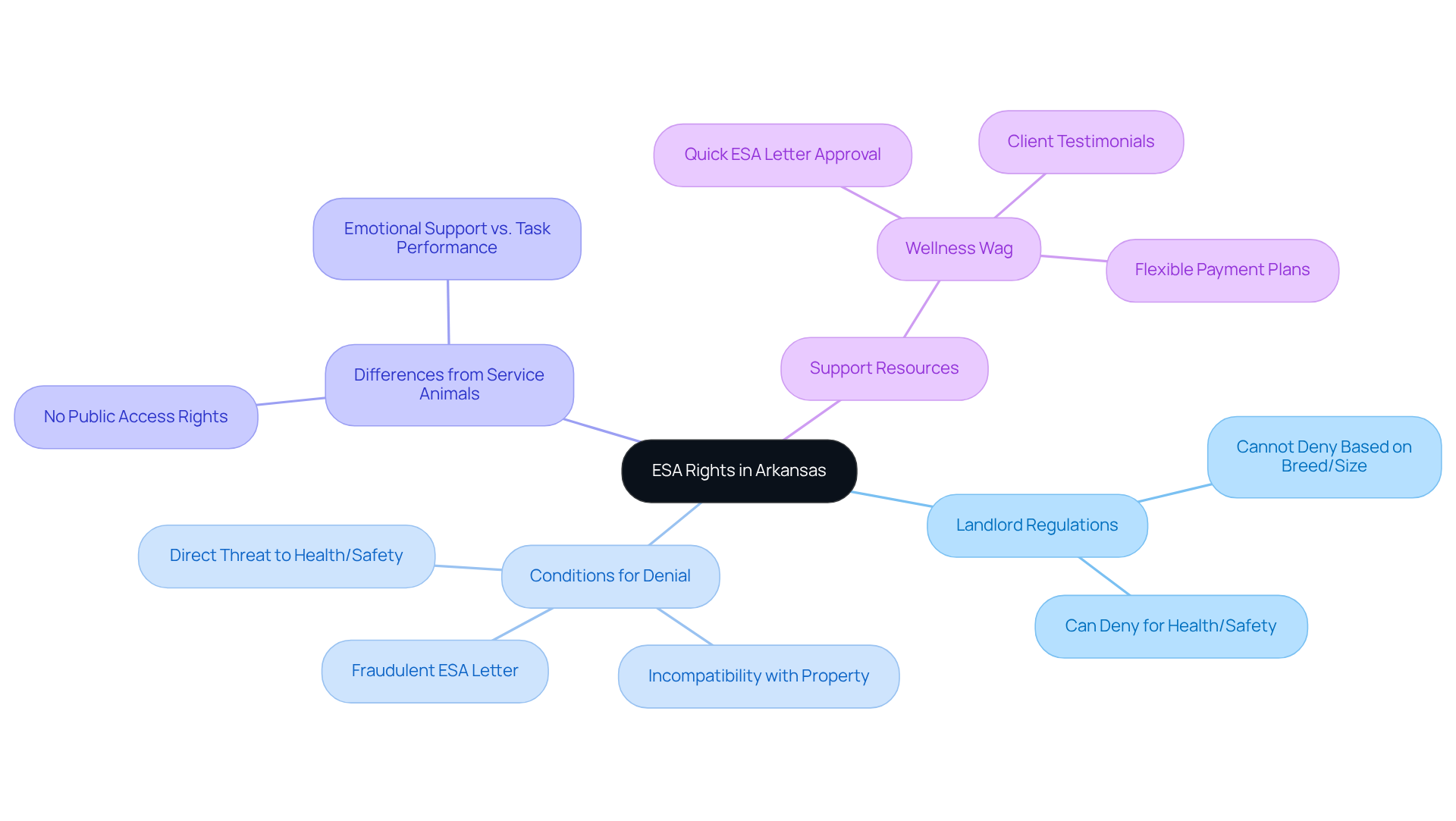
The Importance of ESA Letters: Facilitating Housing and Travel for Owners
Living with mental health challenges can be incredibly difficult, and finding a supportive environment is often a struggle. For many, emotional support animals in Arkansas provide a sense of comfort and security. ESA documents are essential papers that allow individuals to live with their emotional assistance animals in housing environments where pets are usually banned. They also facilitate travel alongside ESAs on airlines, enabling owners to preserve their emotional comfort during challenging trips.
The importance of having a valid ESA document cannot be overstated. It not only offers crucial legal protections under the Fair Housing Act but also significantly enhances the quality of life for individuals with mental health conditions who require an emotional support animal in Arkansas. Have you ever felt the weight of anxiety or depression? Statistics reveal that approximately 84% of ESA owners report noticeable improvements in their mental health, with 62% indicating significant reductions in stress and anxiety levels due to their ESAs. This transformation is not just a statistic; it’s a testament to the profound impact these animals can have on our lives.
Practical instances abound, illustrating how emotional support animal Arkansas documents have enabled individuals to secure housing in pet-restricted settings and travel comfortably with their beloved companions. Travel specialists emphasize that possessing an ESA document is vital for understanding airline regulations, ensuring that emotional assistance animals can accompany their owners during flights. This legal documentation is not merely a formality; it is a lifeline for many, reinforcing the essential role of an emotional support animal in Arkansas in enhancing mental well-being.
In moments of distress, knowing that your ESA is by your side can make all the difference. It’s important to recognize the support available to you and how these documents can facilitate a more fulfilling life with your emotional support animal in Arkansas.
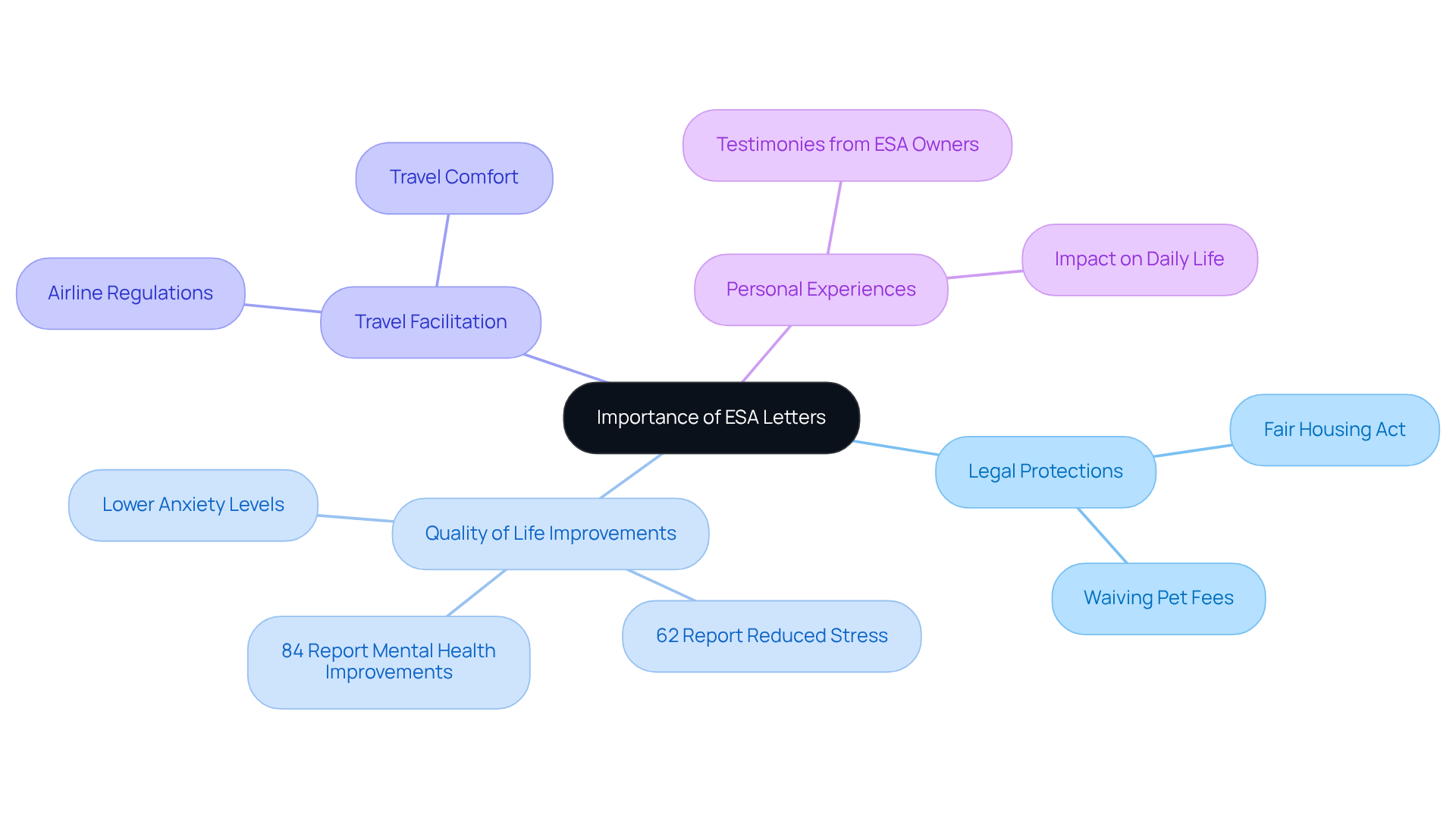
Cost Considerations: Affordable ESA Letter Services and Cashback Offers
At Wellness Wag, we understand the emotional challenges many individuals face when seeking an emotional support animal in Arkansas for their mental health. The journey toward healing can often feel overwhelming, and the financial aspect should never be an additional burden. That’s why we offer economical ESA document services, with the fee for acquiring an ESA document set at $129. To make this service more accessible, we provide flexible payment options starting at just $32.25. This approach ensures that emotional support is attainable for those who need it most.
We also recognize that managing finances can be daunting, which is why our interest-free payment options allow customers to divide their payments into four manageable installments. This thoughtful solution helps alleviate financial barriers, enabling individuals to focus on their emotional well-being. Our commitment to your satisfaction is further reinforced by a money-back guarantee for ESA documents, fostering confidence in our services.
Linda S., a satisfied customer, beautifully captures the essence of our mission: “Applying for an ESA through Wellness Wag was the best decision I made. It was an effortless process and the team was very professional.” Her experience reflects the compassionate support we strive to provide.
Understanding the cost implications of obtaining an emotional support animal Arkansas letter is crucial for those in need. This knowledge empowers individuals to overcome financial obstacles that could impede access to essential emotional assistance. In fact, statistics show that approximately 70% of individuals in Arkansas find these services financially manageable. This reinforces our belief that mental health support should be within reach for everyone, and we are here to help you on that journey.
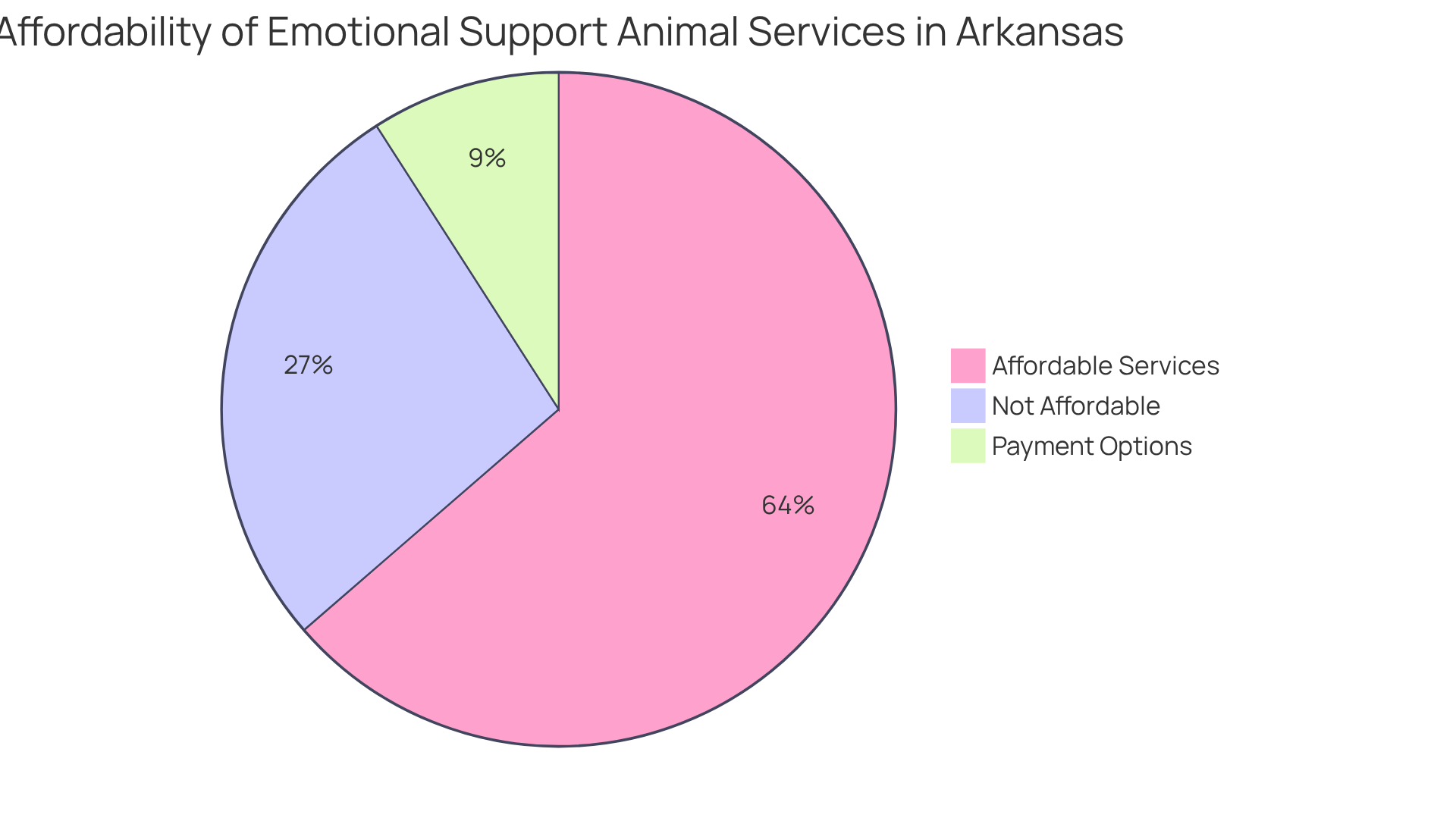
Conclusion
Understanding the essential role of emotional support animals (ESAs) in Arkansas reveals the profound impact these companions can have on mental health and well-being. Many individuals face emotional challenges that can feel overwhelming. The journey to obtaining an ESA letter, navigating legal protections, and knowing one’s rights as an ESA owner are crucial steps for those seeking comfort and support during challenging times. Have you ever felt alone in your struggles? An ESA could be the supportive companion you need.
Key insights from the article emphasize:
- The streamlined process offered by Wellness Wag for obtaining ESA letters
- The legal protections under Arkansas law
- The importance of understanding the distinctions between ESAs and service animals
It’s essential to recognize that various types of animals can be recognized as ESAs, providing companionship tailored to individual needs. Additionally, understanding the rights of owners in housing situations and the financial considerations associated with obtaining ESA documentation can help alleviate some of the stress involved in this process.
In conclusion, the significance of emotional support animals in Arkansas cannot be overstated. They not only provide companionship and comfort but also play a vital role in enhancing the quality of life for individuals facing emotional challenges. By understanding the legal framework, advocating for their rights, and utilizing accessible services like those offered by Wellness Wag, individuals can ensure they receive the support they deserve. Embracing the journey with an emotional support animal can lead to profound improvements in mental health and overall well-being. Remember, you are not alone; support is available, and an ESA could be a transformative part of your healing journey.
Frequently Asked Questions
What is Wellness Wag and how does it assist in obtaining ESA letters in Arkansas?
Wellness Wag is a platform that helps individuals obtain emotional support animal (ESA) letters in Arkansas. The process starts with a brief online assessment to determine eligibility, followed by a personalized consultation with licensed medical professionals. Once approved, individuals receive their official ESA letter within 24 hours.
What are the benefits of obtaining an ESA letter through Wellness Wag?
The key benefits include a quick turnaround time of 24 hours for receiving the ESA letter, which is essential for housing or travel. This rapid process is particularly beneficial for individuals facing urgent restrictions due to mental health conditions, allowing them to focus on their emotional well-being.
What laws protect emotional support animals in Arkansas?
In Arkansas, emotional support animals are protected under the Fair Housing Act (FHA) and the Air Carrier Access Act (ACAA). These laws allow individuals with mental health conditions to live with their ESAs in housing that typically restricts pets and to travel with them on airlines.
What rights do ESA owners have under Arkansas law?
ESA owners have the right to live with their animals without discrimination, and landlords must provide reasonable accommodations for ESAs. Landlords cannot impose additional fees or deposits for ESAs and must respond to ESA requests within 10 days.
How do emotional support animals differ from service dogs?
Emotional support animals provide emotional comfort and support but do not have the same access rights in public spaces as service dogs, which are specially trained to perform tasks for individuals with disabilities and enjoy broader legal rights under the Americans with Disabilities Act (ADA).
What is the eligibility criteria for obtaining an ESA letter in Arkansas?
To qualify for an ESA letter in Arkansas, individuals must have a minimum 30-day relationship with a licensed mental health professional. This requirement ensures that the professional can understand the individual’s situation and provide appropriate support.
What is Arkansas law HB1420 regarding ESAs?
Arkansas law HB1420 requires licensed mental health professionals to establish a 30-day relationship with clients before issuing ESA documentation. It also mandates annual reevaluations to prevent fraud and ensure the legitimacy of ESA ownership.
How can ESA owners advocate for their rights?
ESA owners should communicate openly with landlords and airlines about their legal protections to ensure their emotional support animals are recognized and accommodated. Understanding these rights is crucial for fostering a supportive environment for both the owners and their ESAs.
Certify Your Emotional Support Animal Today

Why You Can Rely on Us?
At Wellness Wag, we believe your pet deserves care rooted in both science and compassion. Each article is carefully researched, written in clear language for pet owners, and then reviewed by qualified professionals to ensure the information is evidence-based, current, and practical for real-life care. Our goal is to help you feel confident in making informed decisions about your pet’s health and well-being.
Reviewed by
Angela Morris, MSW, LCSW
Angela is a licensed clinical social worker with 20 years of experience in patient advocacy and community mental health. She has assisted numerous clients with ESA evaluations and brings a deep understanding of disability accommodations, ensuring that all information is accurate, supportive, and practical.

Written by :
Lena Park
Last Updated :
July 24, 2025












